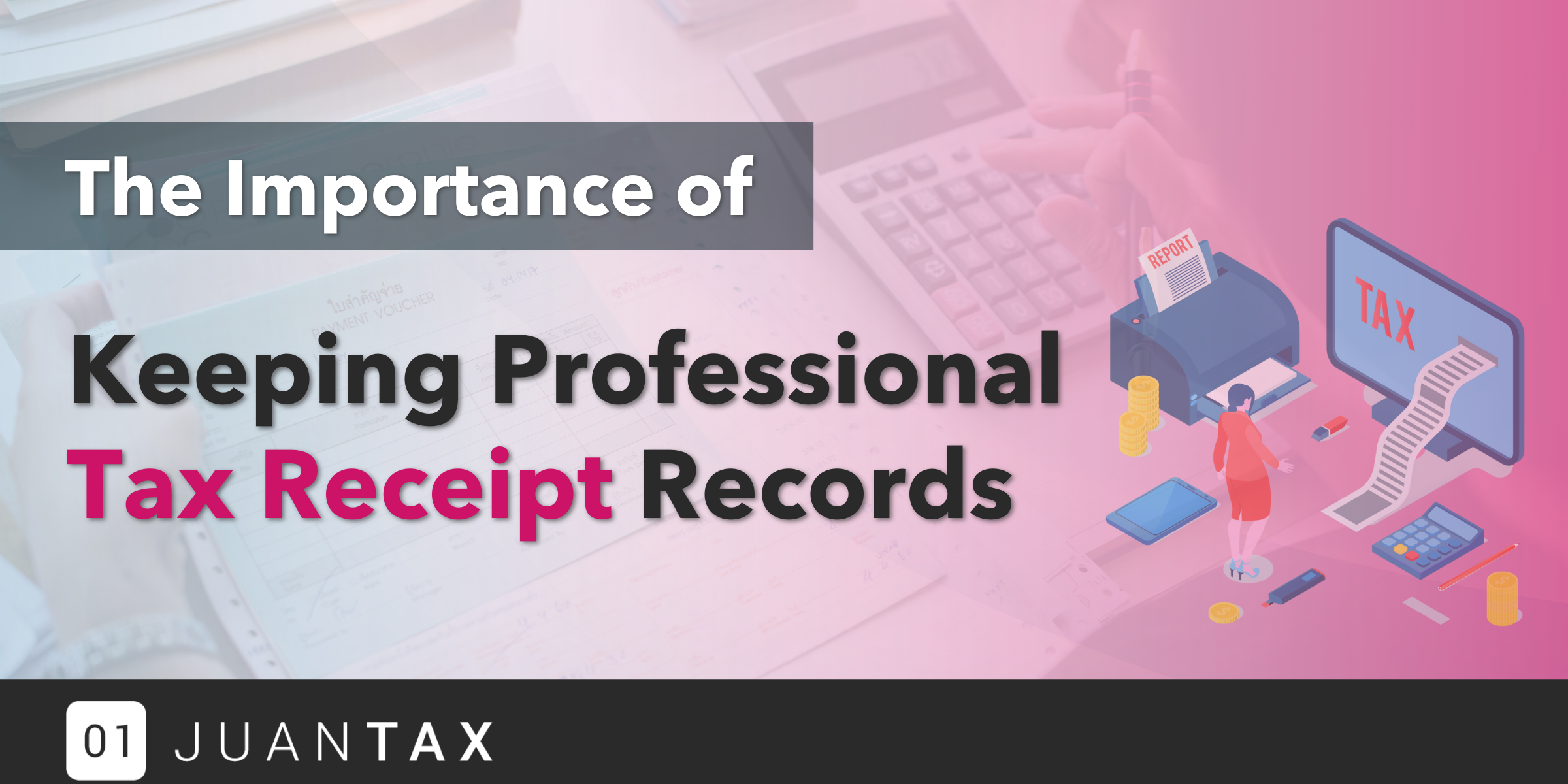Keeping professional tax receipt records is crucial for individuals and businesses as it helps them accurately report their income, deductions, and expenses to the tax authorities. These records serve as proof of transactions and can be used to support the tax returns filed.
For businesses, proper tax record-keeping is important as it helps them avoid penalties, fines, and audits from tax authorities. It also helps them track their expenses and revenues, identify areas of improvement, and make informed financial decisions. For individuals, keeping accurate tax records can help them claim deductions and credits they are entitled to, which can lower their tax liability. It also helps them avoid penalties and fines in case of an audit.
Overall, professional tax receipt records are essential for individuals and businesses to comply with the Local Government Code, particularly Section 139, which mandates payment of professional tax to the province. These records must include various documents such as PRC ID, deeds, receipts, prescriptions reports, books of account, plans and designs surveys, and maps. Failure to maintain proper tax receipt records can result in penalties and legal action from local government units.
Therefore, it is crucial to keep accurate and organized records of professional tax receipts to demonstrate compliance with tax regulations and avoid potential legal consequences. By prioritizing the importance of keeping professional tax receipt records, individuals and businesses can ensure their continued ability to operate while avoiding unnecessary penalties and maintaining their credibility with local government authorities.
In general, an article on tax receipt records may cover topics such as the importance of keeping proper tax records, the legal requirements for record-keeping, different types of records that need to be maintained, and best practices for organizing and storing tax receipts. The article may also discuss common mistakes people make in tax record-keeping and how to avoid them, as well as the consequences of not keeping proper tax records. Additionally, the article may provide tips on how to simplify the record-keeping process and tools that can help individuals and businesses maintain accurate tax records.
Reasons Why Professional Tax Receipt is Important
Professional tax receipt records are important for several reasons. Firstly, they serve as proof of income and expenses for individuals and businesses, which is required for accurate tax reporting. Secondly, they can be used to claim tax deductions and credits, which can lower the tax liability. Thirdly, maintaining proper tax records can help individuals and businesses avoid penalties, fines, and audits from tax authorities. Additionally, keeping accurate tax records can help businesses track their financial performance, identify areas of improvement, and make informed financial decisions.
These are all valid reasons why professional tax receipt records are important. Let’s expound more on each of them:
- Compliance: Keeping proper tax records is a legal requirement, and failure to do so can result in penalties, fines, and even legal action. Maintaining professional tax receipt records helps individuals and businesses stay compliant with tax regulations and avoid any potential legal issues.
- Record-keeping: Tax receipt records serve as proof of income and expenses, which is necessary for accurate tax reporting. Proper record-keeping helps individuals and businesses avoid mistakes or discrepancies in their tax filings, which can lead to audits or penalties.
- Credibility: Maintaining professional tax receipt records demonstrates a commitment to financial responsibility and accountability. This can enhance an individual or business’s credibility and reputation with stakeholders, including investors, lenders, and customers.
- Transparency: Proper record-keeping and maintenance of tax receipts can help increase transparency in financial reporting. This can help build trust with stakeholders and prevent any potential conflicts or issues related to financial mismanagement.
- Access to benefits: Keeping accurate tax records is necessary for claiming deductions, credits, and benefits that an individual or business may be entitled to. This can help reduce tax liability and improve financial outcomes.
- Improved financial management: Proper tax record-keeping can help individuals and businesses track their financial performance, identify areas of improvement, and make informed financial decisions. This can lead to better financial management and improved profitability over time.
Overall, maintaining professional tax receipt records is crucial for individuals and businesses that want to stay compliant, build credibility, improve financial management, and access various tax benefits and credits.
Who Needs a Professional Tax Receipt
Professional tax receipts are important for anyone who earns income and is required to pay taxes. This includes individuals, sole proprietors, small businesses, corporations, and other entities that generate revenue. Anyone who files a tax return with the tax authorities needs to maintain proper tax records, including receipts for income and expenses, in order to accurately report their income and claim any deductions or credits they are entitled to. Proper record-keeping and maintenance of professional tax receipts is also necessary to stay compliant with tax regulations and avoid any potential legal issues or penalties.
These are the following individuals who may need professional tax receipts::
- Professionals: This includes doctors, lawyers, consultants, and other professionals who earn income through their specialized services. They are required to maintain proper tax records, including receipts, to accurately report their income and claim any applicable deductions or credits.
- Business owners: Business owners, including sole proprietors, partnerships, and corporations, need to maintain professional tax receipts for all income and expenses related to their business. Proper record-keeping is necessary for accurate tax reporting and to avoid any potential legal issues or penalties.
- Self-employed individuals: Self-employed individuals, including freelancers and independent contractors, need to maintain professional tax receipts for all income and expenses related to their work. They are required to file their taxes as self-employed individuals and need to accurately report their income to avoid any potential legal issues or penalties.
- Contractors: Contractors, including construction contractors and independent contractors in various industries, need to maintain professional tax receipts for all income and expenses related to their work. They are required to file taxes as self-employed individuals and need to accurately report their income to avoid any potential legal issues or penalties.
- Traders: Traders who earn income through buying and selling securities, commodities, or other financial instruments need to maintain professional tax receipts for all transactions related to their trades. Proper record-keeping is necessary for accurate tax reporting and to claim any applicable deductions or credits.
In summary, anyone who earns income through their work or business needs professional tax receipts to accurately report their income and expenses, claim any applicable deductions or credits, and stay compliant with tax regulations.
Requirements Needed to Obtain Professional Tax Receipt
In order to obtain professional tax receipts, individuals and businesses need to maintain proper records of their income and expenses. This includes keeping track of all receipts related to income, expenses, and other financial transactions throughout the year. Additionally, individuals and businesses need to ensure that all receipts are accurate, complete, and legible, and include relevant information such as the date, amount, and description of the transaction.
However, the requirements needed to obtain professional tax receipts may vary depending on the jurisdiction and type of professional or business. Here are some general requirements that may be needed:
- Registration: Professionals and businesses may need to register with the tax authorities in their jurisdiction in order to obtain a tax identification number or other necessary documentation.
- Proof of qualifications: In some professions, such as healthcare or legal services, professionals may need to provide proof of their qualifications and certifications in order to obtain professional tax receipts.
- Proof of identity: Individuals and businesses may need to provide proof of identity, such as a passport or driver’s license, in order to obtain professional tax receipts.
- Tax clearance: In some jurisdictions, individuals and businesses may need to obtain a tax clearance certificate in order to obtain professional tax receipts. This certificate shows that the individual or business is up to date on their tax obligations.
- Compliance with regulations: Professionals and businesses need to comply with tax regulations and maintain proper tax records in order to obtain professional tax receipts. This includes keeping track of all income and expenses and filing taxes on time.
- Payment of fees: Some jurisdictions may require individuals and businesses to pay fees in order to obtain professional tax receipts. These fees may vary depending on the type of professional or business.
In summary, the requirements needed to obtain professional tax receipts may vary depending on the jurisdiction and type of professional or business, but generally include registration, proof of qualifications and identity, tax clearance, compliance with regulations, and payment of fees.

Consequences of Not Having Professional Tax Receipt
Not having professional tax receipts can have several consequences for individuals and businesses. In most jurisdictions, individuals and businesses are required to keep proper tax records, including receipts, in order to accurately report their income and expenses and comply with tax regulations. Failing to do so can result in several consequences, including:
- Fines and penalties: Not having proper tax receipts can result in fines and penalties from tax authorities. This can include penalties for failure to file tax returns, failure to pay taxes, or failure to maintain proper tax records.
- Legal action: In some cases, not having proper tax receipts can result in legal action from tax authorities, such as audits or investigations. This can lead to additional fines or even criminal charges in extreme cases.
- Loss of credibility: Not having proper tax receipts can damage the credibility and reputation of individuals and businesses. This is particularly important in professions where trust and integrity are highly valued, as it can result in loss of clients or customers.
- Inability to do business: In some cases, not having proper tax receipts can prevent individuals and businesses from being able to do business. This can be due to regulatory requirements or the inability to provide necessary documentation to clients or customers.
- Limited access to benefits: Without proper tax records, individuals and businesses may be unable to access certain benefits, such as tax credits or deductions, or government programs that require proof of income or expenses.
In summary, the consequences of not having professional tax receipts can include fines and penalties, legal action, loss of credibility, inability to do business, and limited access to benefits. It is important for individuals and businesses to maintain proper tax records in order to avoid these consequences.

How to Avoid Penalties
Avoiding penalties is a critical aspect of managing taxes for both individuals and businesses. Failure to comply with tax regulations can result in fines and legal action from tax authorities. There are several steps that can be taken to avoid penalties and ensure compliance with tax regulations. In this section, we will discuss some tips on how to avoid penalties related to tax receipts.
Here are some important steps that can be taken to avoid penalties related to tax receipts. Here is a more detailed explanation of each step:
- Know the requirements: It is important to understand the tax regulations and requirements related to tax receipts in your jurisdiction. This includes knowing which receipts need to be kept, how long they need to be kept, and what information they should contain.
- Register on time: If registration is required to obtain a professional tax receipt, it is important to do so on time. Late registration can result in penalties and additional fees.
- Keep accurate records: Accurate record-keeping is critical for compliance with tax regulations. This includes maintaining proper tax receipts and keeping them organized and easily accessible.
- Respond to notices: If you receive a notice from tax authorities related to your tax receipts, it is important to respond promptly and appropriately. Ignoring notices can result in additional penalties and legal action.
- Seek professional advice: If you are unsure about tax regulations related to your professional tax receipts, it is advisable to seek professional advice from a tax expert or accountant. They can provide guidance on compliance and help you avoid penalties.
In summary, to avoid penalties related to tax receipts, it is important to know the requirements, register on time, keep accurate records, respond to notices, and seek professional advice if necessary. Taking these steps can help individuals and businesses ensure compliance with tax regulations and avoid penalties.

Conclusion
In conclusion, maintaining professional tax receipt records is crucial for both individuals and businesses. It ensures compliance with tax laws, helps prevent errors and mistakes, and enables you to take advantage of deductions and credits that you may be entitled to. By keeping accurate and up-to-date records, you can save time, avoid penalties, and have peace of mind knowing that your tax obligations are being met.
Therefore, it is highly encouraged that people prioritize record-keeping and consider using technology solutions like accounting software or cloud-based services to make the process easier and more efficient. With the right tools and commitment, professionals can stay on top of tax obligations and avoid unnecessary stress and financial strain.
By using JuanTax’s cloud-based solutions, you can streamline your bookkeeping process and ensure compliance with tax laws. This can save you time, minimize errors, and reduce the risk of penalties and fines. Sign up now at https://juan.tax/ !













